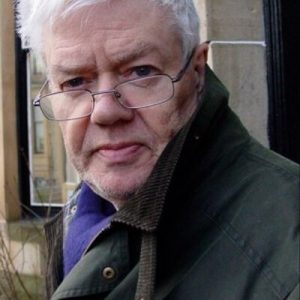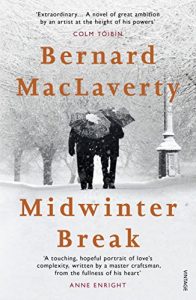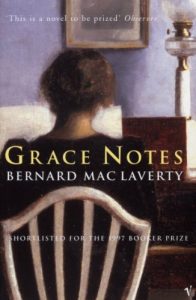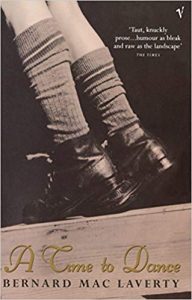‘You write about where you come from. And then you realise you have your own stories to tell’: An Interview with Bernard MacLaverty
 It is a bright day in Glasgow on the day I go to interview Bernard MacLaverty. I mount the steps to his home in the West End of the city; one of the storm doors is open which feels akin to a welcome and several umbrellas are propped in the corner at the front door. He comes to the door, somewhat smaller than I had expected, but his wide face offers enough of a smile to put me at ease.
It is a bright day in Glasgow on the day I go to interview Bernard MacLaverty. I mount the steps to his home in the West End of the city; one of the storm doors is open which feels akin to a welcome and several umbrellas are propped in the corner at the front door. He comes to the door, somewhat smaller than I had expected, but his wide face offers enough of a smile to put me at ease.
He is one of my all- time favourite authors and I have done my homework; brought up in Belfast, failed A Level English (surely an indication of a fault in the system?), a job in a laboratory at Queen’s where his writing talent was noticed, invited to join the mighty Philip Hobsbaum’s The Belfast Group along with Seamus Heaney, and a degree from Queen’s as a mature student. Five novels, five short story collections, three screenplays, several television and radio plays and two children’s books followed. An impressive oeuvre by any standards. And then there are the opera libretti, classical music broadcasting on BBC Radio Scotland and the BAFTA award for directing his own best short film!
I tell him about teaching some of his short stories from his early collection, A Time To Dance, soon after it was published in 1982, and how popular the hilarious story of ‘Nelly Skelly’ had been with even the most reluctant readers in an area of multiple deprivation. Nelly Skelly is a boy with a squint, whose mother finds him one afternoon in Princes Street truanting from school and is obliged to take him to her work in a go-go dancing pub where she blindfolds him so that he cannot see what her job actually entails. I am now treated to the background to the story, humorously delivered in a totally intact Belfast accent by this affable and avuncular man who is already beginning to feel like the person Bernard rather than the author MacLaverty. He had been required to attend a medical examination in Edinburgh city centre to be deemed fit for teaching – ‘Jeysus! Did they think that I’m going to be flying planes or something!’ – and had gone into a nearby pub afterwards. He was surprised when a scantily clad woman started gyrating on one of the nearby tables. He had clearly misunderstood the nature of the pub. Well worth the mistake though was the story it spawned, entertaining and humane, features which I was to learn over the decades are deeply etched hallmarks of his work.
Aware of how valuable every minute of this interview is, I decide to plunge headlong into the meat of the thing, the actual craft of his writing, and I ask him to tell me more about his focus on the significance of each word in his work, what he has called the ‘weight’ of a word, which he has likened in the past to how his mother once knew that the bird she was holding was dead due to the weight of it.
His reply is a master class in how to write. He starts by explaining an approach he used early on as a writer of short stories which he subsequently adopted for his novel writing as well.
 ‘Each word must fight for its place as it were. If you get the details right your readers are going to be convinced. An example of that leaps into my head from the latest novel, Midwinter Break, published in 2017, about a long married couple who spend a weekend away in Amsterdam. They are struggling to find meaning in their relationship and in life itself.
‘Each word must fight for its place as it were. If you get the details right your readers are going to be convinced. An example of that leaps into my head from the latest novel, Midwinter Break, published in 2017, about a long married couple who spend a weekend away in Amsterdam. They are struggling to find meaning in their relationship and in life itself.
He describes a scene early on in the novel where the wife unwraps a pair of M and S pyjamas she has bought for her husband and throws the cellophane into a wastepaper basket. The cellophane then expands, trying to regain its shape, and begins to grow again. As he is talking, I remember that detail from my own reading of the novel, thinking at the time what a vivid and easily imagined detail it was. However, for MacLaverty, the accuracy or intensity of an image is not enough. For it to survive the reviewing process it has to do more, it has to ‘fight for its place’.
Returning to the cellophane he continues,
When you’re reading things over you say to yourself, ‘’Why should that fight for its place. That’s just a bit of detail that’s holding back the story’’. But then it’s not!,’ and his face becomes excited here, ‘Because it’s about those two people trying to have their own place. So however deep into the text it is these details somehow or other speak about the character and the people who are in the story and develop it and strengthen it and act as a kind of inner scaffold. If it was something that had no bearing on the characters, I don’t think I would keep it.
I would like to ponder this golden lesson, but I am immediately offered more. He continues to contextualise with reference to ‘the great masters’:
I’m reading Chekov at the moment. Sometimes he will describe people in detail and I don’t think it’s necessary. The reason for the description must have other additional things to say. If she wore a brooch with a dolphin on it, you had better be thinking ‘’What’s the dolphin doing?’’ That’s all I’m trying to say, to give those details a bearing on the character and therefore the story. The story is made up of the way the characters develop or get on or don’t develop…… They (character and plot) are not separate places, they are more or less there when you imagine the story.
We turn to the female characters who regularly feature as protagonists in his stories, and this takes him to his youth in Belfast, and to the many strong women he was brought up with there; his Auntie Mary, his Auntie Betty, his mother, his grandmother:
Those vivid women talking …it was one of the first actual things I did about writing, I got a wee creamy notebook and started writing all Auntie Betty’s phrases into it. She would come up and visit us and I would clock all her sayings and I would write it up. Later on Frank O’Connor said that a character establishes himself or herself just by the way they talk. Auntie Betty was like that.
A couple of Auntie Betty’s gems follow; ‘I can see a midge in a mare’s arse’, he laughs, ‘and she was cleaning round the toilet one day and she said ‘‘You weans must have crooked flutes.’’ From Northern Ireland, the flutes!’ and we both laugh at the ironic humour in the cultural referencing to the ‘other‘ side of the Northern Ireland divide.
 He traces his development from creating male to female protagonists to when he was writing a particular story from his 1994 collection’ Walking the Dog’ called ‘At The Beach’, about a couple on a summer holiday in Spain written from the point of view of the man, who one afternoon half way through the story has a siesta. The focus turns to the woman who goes out for a walk and rediscovering memories of her first communion and first kiss realises to her surprise she is the same person as then. She then takes over the story. ‘For me it was a success and I then went on to write the novel Grace Notes (1997) and I kept on that railway line.’ Grace Notes leads us on to the subject of music and its importance to him both as a person and as a writer. He gestures to the vast collection of floor-to -ceiling CD’s on the walls. He has a lovely simple phrase to explain what writing and music have in common, the importance of ‘this rhythm thing.’ which he illustrates with reference to ‘My Dear Palestrina’, from ‘A Time To Dance’, a particularly poignant short story adapted for both BBC radio and television in 1980.
He traces his development from creating male to female protagonists to when he was writing a particular story from his 1994 collection’ Walking the Dog’ called ‘At The Beach’, about a couple on a summer holiday in Spain written from the point of view of the man, who one afternoon half way through the story has a siesta. The focus turns to the woman who goes out for a walk and rediscovering memories of her first communion and first kiss realises to her surprise she is the same person as then. She then takes over the story. ‘For me it was a success and I then went on to write the novel Grace Notes (1997) and I kept on that railway line.’ Grace Notes leads us on to the subject of music and its importance to him both as a person and as a writer. He gestures to the vast collection of floor-to -ceiling CD’s on the walls. He has a lovely simple phrase to explain what writing and music have in common, the importance of ‘this rhythm thing.’ which he illustrates with reference to ‘My Dear Palestrina’, from ‘A Time To Dance’, a particularly poignant short story adapted for both BBC radio and television in 1980.
We were living on Islay at the time’ – he was Head of English at the secondary school there – ‘I heard a woman on the radio say, ‘I was standing at the piano and I was crying,’ and I wondered why was she crying? Suddenly this foreign woman with a tear or some heart -breaking moment appeared inside my head and I started then to write it.
It is as if he heard the voice of the character and so she existed, which chimes with the way he describes those inspirational women he grew up with whose voices appear in his stories.
He traces his early music education to the radio being left on by default in his home and as a child he would hear classical music. Later he shared musical explorations with good school friends (from St Malachy’s College, a grammar school on the Antrim Road) who all loved classical music and they spent time ‘infecting each other’. One family had a great collection of LPs and he would go ‘call’ – he was specific about the verb used – for the two brothers there. While they were deciding where to go out of an evening they would choose a record to listen to, perhaps Tchaikovsky’s Violin Concerto, or some other recording from the classical repertoire. Equally likely though it would be a jazz or a blues LP, Leadbelly or perhaps Big Bill Broonzy. The young MacLaverty was in a skiffle group too, which he said was ‘very funny’, and he laughes again. Another Belfast scene from his youth is triggered:
There was a guy in Belfast who organised these black singers to come over from America. They sang at the dance halls. It was amazing. Champion Jack Dupress, Jessie Fuller. The guy who organised this ran a bicycle shop, Dougie Knight was his name. Then he kind of started to sell second hand records. You’d be in amongst the bicycle wheels and the pumps and tubes and the like, choosing your records.
This was a time of passion and argument and friendship, major features of life as a schoolboy and out of whose soil of laughter and art – ‘in a time of your life when you slid down the wall laughing …… all the time!’ – the young MacLaverty went from reading Biggles to Dostoyevsky in a oner, then the Russian 19th century, after which his pals all went off in other directions. Many remained lifelong friends; one became a painter, one a philosopher, another a priest, MacLaverty the only one to become a writer.
 St Malachy’s in its time spawned an impressive four novelists, one of whom was Brian Moore ‒ ‘his brother Seamus was my doctor, saved my life once when I was very ill as a boy’ ‒ more local connections, and he manages to restrain himself from another anecdote about Seamus coming to the house when he was desperately ill as a child, the scene which inspired ‘My Dear Palestrina’ (A Time to Dance). The other three novelists were his namesake but no relation Michael McLaverty , Bernard himself and Robert McLiam-Wilson who wrote Ripley Bogle. Quite a feat for one small grammar school over only a twenty-year period. I begin to imagine the quality of the English teaching there but am pre-empted by another recollection enthusiastically told.
St Malachy’s in its time spawned an impressive four novelists, one of whom was Brian Moore ‒ ‘his brother Seamus was my doctor, saved my life once when I was very ill as a boy’ ‒ more local connections, and he manages to restrain himself from another anecdote about Seamus coming to the house when he was desperately ill as a child, the scene which inspired ‘My Dear Palestrina’ (A Time to Dance). The other three novelists were his namesake but no relation Michael McLaverty , Bernard himself and Robert McLiam-Wilson who wrote Ripley Bogle. Quite a feat for one small grammar school over only a twenty-year period. I begin to imagine the quality of the English teaching there but am pre-empted by another recollection enthusiastically told.
‘A good teacher can set you alight’, he says. ‘The Wee Dean,’ – you have to have nicknames for your priests he explains – ‘The Wee Dean worked very hard, always having sheets printed, or rather ‘Gestetnered’ – and I think we both hear the echo of those clunky printing machines. ‘He introduced us to DH Lawrence and Gerald Manley Hopkins’ whom he describes as a kind of rock star to them in 1958, and whose writing he tried to imitate. ’Seamus Heaney did the same at his school in Derry, and began to put words down on the page.’ I feel another mini masterclass in creative writing coming up and am not disappointed. He was after all a teacher of English for many years, and has been writer in residence and guest writer in four universities;
When I’m teaching Creative Writing I tell people it’s like playing squash. You go out with all your kit on, your white socks, gutties and all your stuff on, and you lob the ball and you miss it, and it takes you three years before it will go where you want it to go ….. and you realise that putting on so many adjectives is not a good idea. You’re just trying out things.
It transpires that the Wee Dean was not the only positive influence on the young Bernard’s writing. The class had read a short story by said Michael McLaverty. Another English teacher who lived a few doors down called Theodora McCrudden’ – now there’s a name! – took an interest in young Bernard’s early writing and encouraged him. She took him over to Queen’s one night to a talk on the short story by Michael McLaverty. The speaker was ‘almost inarticulate with enthusiasm’ (about Chekov and Dostoyevsky) ‘and you could hardly wait to get home or to get down to the book shop to get these things and read them.’ It was Michael who taught him early on to focus on the single word and how it would ‘affect or infect’ what the writer was trying to say, and whether to use an Irish or an English word.
When asked about being a quintessentially Irish writer he corrects me, ‘I’m an Irish person. You write about where you come from. It’s natural as writers from a geographical whole to be influenced by the writers that have come before you.’ At this point in the interview a wee girl outside the window is climbing up a tree and he notices this and fears for her welfare. MacLaverty, the watchful caring grandfather. Once we ascertain that she is safely on her way down we return to the Irish question:
We are in a geographical place under the shadow of James Joyce. He covered it all, he really did, that territory of the sermon, hell, eternity, Catholicism which I believed in totally at that point and have ceased to believe in. That was a springboard into trying to write. You’re there, you’re liking the people who come from the same piece of country as you do, you’re there although I am flying off to Russia and Germany and Kafka in my head. The importance of other writers dealing with the things that have confounded you. And you’re trying to find answers to them. And you realise your own uniqueness and that you have your own story to tell, or stories.
And what stories! Before I leave, he introduces me to Madeline, his wife of fifty-one years, who has been reading at the window of another large sitting room in the flat. Quintessentially Irish yes, but he is even more quintessentially a family man, whose four children and eight grandchildren live in the same post code area as he does, and who no doubt benefit from time to time from the shelter of these umbrellas at the front door.
As I walk down Byres Road, I see again the rich glimpses into the Belfast background of this man and this writer. I ponder his vast literary knowledge, the masters with whom he is now favourably compared, and savour the creative writing lessons I have been given. But as I head back to Edinburgh, it is the poignancy of Midwinter Break I return to, its longings, its disappointments and pathos, and it is the attempts of that expanding cellophane to regain its shape that fills my mind, and my heart.

Leave a Reply